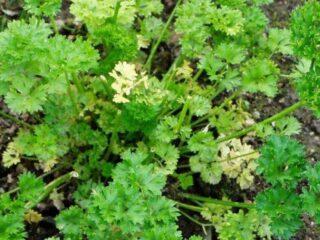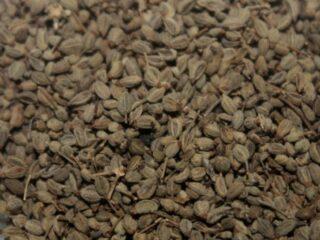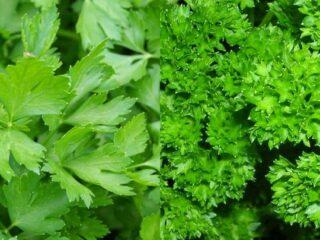Content
- 1 The benefits and harms of parsley for pregnant women
- 2 Is it possible to eat parsley during pregnancy?
- 3 How much parsley can you eat during pregnancy?
- 4 How to properly use parsley during pregnancy
- 5 Harm of parsley for pregnant women and contraindications
- 6 Conclusion
- 7 Reviews on the use of parsley during pregnancy
Parsley during pregnancy often raises many questions among young mothers. This is due, first of all, to a large number of myths about this product. Before deciding whether to include it in your diet or not, it is worth studying the characteristics of the plant.
The benefits and harms of parsley for pregnant women
It has long been known that greens are rich in nutrients and microelements. But it is the properties of parsley that are very valuable for pregnant women.
To assess the effect of a plant on humans, its main components should be studied:
- Retinol helps increase the body's protective properties, helps fight viruses, and has a wound-healing effect. Thanks to vitamin A, metabolic processes are normalized, and the skin becomes elastic and smooth.
- Beta-carotene has a beneficial effect on the nervous system.Pregnant women's resistance to stress increases and they can more easily endure emotional overload. With regular use, it reduces the likelihood of developing cancer, improves vision, and protects against UV rays.
- Vitamin B6 helps normalize memory and improve performance. Thanks to it, you can lower blood pressure and help the body remove excess fluid.
- Vitamin B9 plays an important role in the functioning of the circulatory and immune systems, promotes the release of hydrochloric acid in the stomach, which increases appetite.
- Parsley contains a large amount of vitamin C. It is useful for pregnant women because it promotes blood renewal, activates the work of the endocrine glands, and is a powerful antioxidant.
- Vitamin E protects against viruses and bacteria and takes part in hormonal processes in the body.
- Vitamin K ensures proper absorption of calcium and vitamin D and has an antihemorrhagic effect. One of the important properties of potassium is the removal of poisons from the body.
- Vitamin PP is known for its detoxifying effects. It takes an active part in normalizing lipid metabolism and dilating small blood vessels in the brain.
- Calcium is important for the structure of the baby’s musculoskeletal system, and also takes part in the processes of blood clotting.
- Iron supports the functioning of the thyroid gland and the immune system, and is involved in the creation of nerve impulses.
- Cobalt is one of the microelements necessary for hematopoiesis, the synthesis of proteins, fats and carbohydrates, and normalizes the functioning of the endocrine system.
- Silicon is important for strengthening connective tissue, necessary for the full growth and development of bones: it retains fluid in joints and cartilage.
- Magnesium helps normalize blood glucose levels, strengthens tooth enamel, helps relieve migraines and reduce fatigue. The microelement also has a positive effect on bone growth.
- Copper is an active participant in the synthesis of hemoglobin, has an anti-inflammatory effect, and supports the functioning of the musculoskeletal system.
- Chromium helps overcome stress and acts as a substitute for iodine in the body of a pregnant woman.
- Zinc helps heal abrasions and cuts, shortens the postoperative recovery period, and is effective for many skin diseases.

100 g of parsley contains only 49 kcal
Such a rich composition has a beneficial effect on both mother and child only in one case, if there are no contraindications to its use. Serious negative consequences of introducing the plant into the diet are stimulation of the uterine walls and miscarriage.
Is it possible to eat parsley during pregnancy?
Depending on the characteristics of pregnancy, doctors recommend a certain number of products to a woman.
Parsley, like other greens, has a positive effect on the mother’s body, saturating it with nutrients. The plant contains antioxidants that increase the protective properties of the immune system.
Useful vitamins and substances in parsley that are important for a pregnant woman:
- folic acid, which is one of the most important microelements for fetal development;
- iron to prevent the development of anemia in the child and mother;
- phosphorus and other minerals that have a direct effect on the formation of bone tissue.
The rest of the wealth of nutrients helps the mother to safely bear the child without harm to her health
Parsley during early pregnancy
Despite the benefits, for women who are just getting pregnant, eating greens can be dangerous. The substances contained in parsley stimulate the functioning of the muscular system. In this regard, pregnant women experience muscle spasms, which can cause miscarriage. Women should not eat greens in the first weeks of pregnancy.
It is not necessary to completely give up parsley, but it is recommended to limit the amount of it on the menu. You should eat greens no more than once a day.
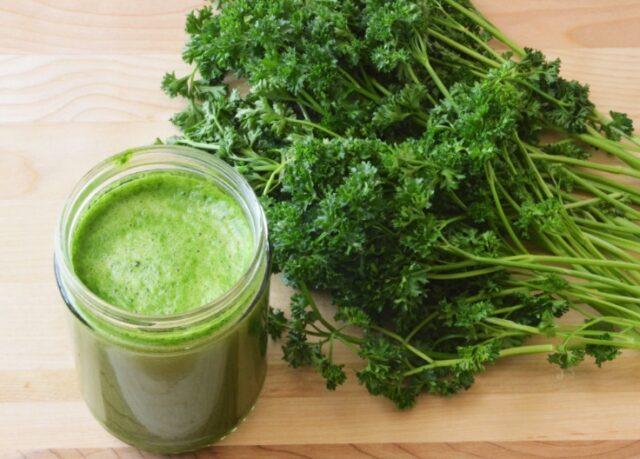
The rate of consumption of parsley in the first month of pregnancy should be no more than a pinch per day.
Parsley during pregnancy in the 2nd trimester
During this period, the child is actively growing and developing, so you should be smart about consuming greens. You can add parsley to dishes several times a day in small portions. Pregnant women can also have fresh herbs in salads.
A woman should always monitor her body’s reaction. If after eating greens you feel unwell, have a stomach ache or feel nauseous, then you need to exclude the product from your diet and consult a doctor.
Parsley during pregnancy in the 3rd trimester
The norms for consuming greens remain the same as in the second trimester: no more than 1/5 of a bunch. Individual characteristics should also be taken into account: if the pregnant woman feels great, then it is allowed to exceed the volume. If a woman has toxicosis and is at risk of premature birth, it is better to avoid the product.
How much parsley can you eat during pregnancy?
Standards vary from person to person, but most doctors adhere to the principle of no more than a twig per day. This is approximately 3 g. You should not eat greens in their pure form: it is recommended to chop them and add them to salads and hot dishes.
How to properly use parsley during pregnancy
It is best to eat fresh herbs; you can add them in dry form as a spice. Drinking plant juice is prohibited throughout pregnancy, but there are other options for using the product.
Parsley decoction during pregnancy
The product cannot be taken internally, but it can be used externally. It copes well with such inflammatory diseases as conjunctivitis. It is enough to apply cotton pads soaked in the broth to your eyes or rinse your mouth. The product also helps with diseases of the oral cavity. If your gums are inflamed, you can rinse several times a day.
To obtain a decoction, pour 300 ml of boiling water over a bunch of parsley and place in a water bath. Simmer over heat for ten minutes and then leave to cool to room temperature.

For mosquito bites, simply wipe the wound with a crumpled parsley leaf.
Parsley root
This part of the plant can be added in crushed form to salads, but it should be taken into account that the product has a specific taste for pregnant women. Doctors do not recommend overusing parsley root, as it is easy to overdose on it.
Often pregnant women are advised to use a decoction to relieve swelling from the limbs and face. For this, 1 tbsp is enough. l. Pour boiling water over the roots and leave to steep for an hour. Strain the finished product and use it for its intended purpose.
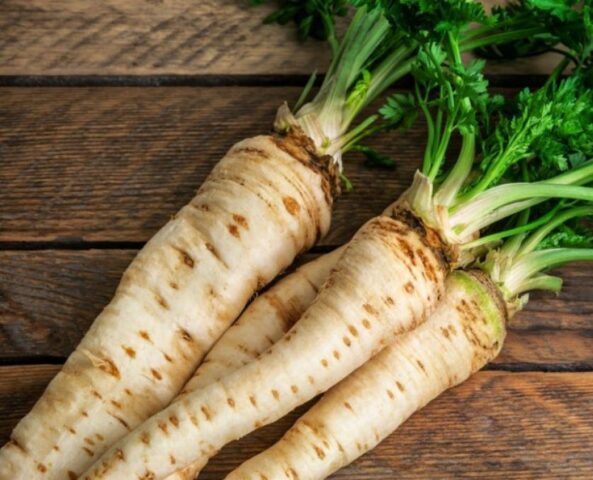
Pregnant women suffering from cystitis and pyelonephritis should not take parsley root.
Parsley infusion
There is a recipe for toxicosis. For this you need 1 tsp. Brew parsley seeds with two glasses of boiling water. Leave to infuse for eight hours, then strain and consume 1 tbsp. l. before meals.
An infusion against pigmentation helps during pregnancy. To do this, several stems need to be doused with boiling water, then chopped and poured with a glass of hot water. After it has cooled, strain it and distribute it into ice cube trays. Wipe the face and décolleté area with the resulting cubes.

Parsley seed tea should not be consumed during pregnancy.
Harm of parsley for pregnant women and contraindications
The most dangerous consequence for pregnant women is miscarriage. But you need to take into account that it can only be provoked by excessive consumption of parsley.
In other cases, greens only bring benefits to the body if used correctly.
Women with the following diseases should not eat parsley during pregnancy:
- acute pathologies of the kidneys and liver;
- allergy to greens;
- miscarriages in previous pregnancies;
- convulsions;
- hypertonicity of the uterus.
Conclusion
Parsley during pregnancy is allowed for those women who have no contraindications. The product can be consumed in limited quantities with a reasonable approach. If signs of deterioration in health appear, you should immediately stop eating greens and consult a doctor.
Reviews on the use of parsley during pregnancy



